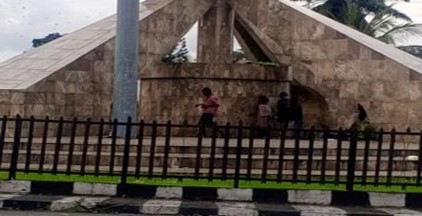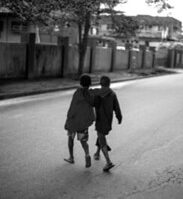By Christian Njoku
As the day winds down in Calabar, with heavy traffic and people hurrying home after work, a new kind of life begins—especially in areas like Marian Road, were food joints and clubs with loud music spring to life, inviting residents to relax before heading home.
At the centre of this nightlife is Daniel Iboro, a former street child who now earns a living as a disc jockey in one of the city’s popular nightclubs.
Tall, dark, and handsome at 21, Daniel could easily pass as a role model for the Gen Z generation. But his journey to this point was far from easy.
At just 13, Daniel became a street child around the Bogobiri area of Calabar, one of those derogatorily referred to as “skolombo” by residents, many of whom did not know the real meaning or origin of the word.
According to him, life on the streets began in 2017 after conflicts with his father.
With nowhere else to go, he turned to the streets, hoping for food and freedom. But both proved elusive because the streets had their own systems and “government.”
Daniel soon got used to the harsh reality: it was common to see fellow street children injured or even die and they conducted the burials in their own crude ways.
Knowing he was heading nowhere, Daniel persistently appealed to be enrolled in school which endeared him to Street Priest Incorporated, a Non-Governmental Organisation (NGO), that helps street children in vulnerable situations.
“I refused to die on the streets, thank God for Street Priest Incorporated who invested in my secondary education. Today, I work as a DJ, but I want to further my studies in Social Works so I can help other street children,” he said.
Similarly, God’s-gift Meyene, another teenager, found refuge with Street Priest Incorporated. He had run away from home after his father neglected him when his mother left the family.
“I left home for the streets, but life there was no better. We slept in front of shops, even in the rain. Sometimes shop owners and passers-by beat us, calling us thugs or thieves; I survived by begging or doing menial jobs,” he said.
While Daniel and God’s-gift were lucky to find help, others have not been so fortunate.
Bassey Henshaw, now 20, has lived on the streets since completing his Common Entrance Examination. He could not proceed to secondary school or learn a trade because his father said he had no money.
He bears a scar on his face from a bottle attack by other street children who tried to steal his money. His right heel also has a deep sore, now putrid from lack of care, after stepping on broken glasses while scavenging.
David Etim, 19, also lives on the streets. He and his elder brother were thrown out of their home in 2014 after their mother accused them of witchcraft, following a prophet’s claim.
“My elder brother was killed by a hit-and-run driver. Since nobody helped us, we dug a hole and buried him ourselves. I have not seen my mother since when she moved out without telling anyone where she was going,” he recounted.

Street children that have made under the stature of Mary Slessor at the Mary Slessor Roundabout, Calabar, their place of abode
The challenge of street children in vulnerable situations is a major problem in many Nigerian cities. In Calabar, the boys are derogatorily called “skolombo” while the girls are referred to “alakasera”
During the day, these groups of boys can be seen in ragged clusters at street corners, either begging or causing nuisance. Others scavenge on refuse heaps to survive.
The girls, however, are less visible in the daytime. At night, many are forced into child prostitution in local brothels and relaxation spots, where clients with a preference for children exploit them.
Although, there are no explicit data from the National Bureau of Statistics (NBS) on children living full-time on the streets like the data on child labour or out-of-school children, these children are everywhere.
Mr William Okina, Senior Director of Development at Street Priest Incorporated, said they meet a lot of children on the streets daily but can only assist a few that show intense desire to leave the streets and be educated.
Okina said they can only assist a few based on the resources available and the willingness of the children to leave the streets because many of them give fake names as they have observed in their database.
“We have been able to fully rehabilitate more than 20 children who were once on the streets and we have many more that move in and out of the streets, it is usually a gradual process to rehabilitate these kids.
He said there is the issue of witchcraft-branding common in Akwa Ibom and Cross River, where children dealing with poverty, trauma or even autism are labelled witches and driven from their homes on a “prophet’s” directive.
“Many of such children earlier branded witches and left to rot away on the streets have been placed in proper systems and are well-behaved, even excelling in school.
“While the problem has remained for years now, what many of us have done as a people is just call the children names like “skolombo” which puts them at risk because “skolombo” in Cross River is a cult group and these are just street children.
“When you call them skolombo which they hate, they become aggressive because it brands them and if the real members of the cult group hear them responding to the name when they are not members, they are endangered even more.”
Okina said when they started reaching out to street children from 2014 it was not as an organisation but just to help one kid at a time but over time they realised that the problem was not just bigger than them, it was everybody’s problem.
He said they have tried reaching out to the public and especially government but the responses are usually slow, uncoordinated, and politically driven.
“Organisations like ours have years of data, experience, and direct access to the children that government can leverage on to build real solutions, but instead we keep seeing quick fixes.
”The truth is, the number of street children keeps rising because for every child you rehabilitate, at least five more take their place on the streets until we start dealing with the drivers of this evil and government decides to work with groups with competence on this matter.”
In July 1990, the Organisation of African Unity (OAU) Assembly of Heads of State and Government adopted and amended the Convention on the Rights of the Child (CRC) into the African Charter on the Rights and Welfare of the Child (ACRWC).
Member states of the OAU, now the African Union (AU), believed that the CRC did not adequately reflect the socio-cultural and economic realities peculiar to Africa and therefore needed to articulate the rights of the African child more contextually.
In 2003, Nigeria enacted the Child Rights Act, drawing from the provisions of both the CRC and the ACRWC, this same law was domesticated in Cross River in 2009 as ‘’A Law to Protect the Rights of a Child and Other Related Matters’’.
However, in spite of these international and local frameworks including the Sustainable Development Goals (SDGs), the protection of children in the state has remained largely ineffective or almost non-existent.
In 2009, Mrs Obioma Imoke, wife of Sen. Liyel Imoke, then Governor of Cross River, founded the Destiny’s Child Centre in Calabar to provide shelter for vulnerable children.
A total of 201 children were enrolled, out of which 153 received formal education and 36 were trained in vocational skills.
The response of Gov. Ben Ayade’s administration from 2015 was the establishment of a security outfit codenamed “Operation Skolombo”, to carry out punitive actions against these street children, who were said to be becoming uncontrollable.
While this reinforced society’s negative perception of the children, it did not address the underlying issue of how children became products of the streets and how they survive daily.
Similarly, in 2018, the government of Cross River announced plans to rehabilitate over 1,000 street children and established the Child Protection Commission.
The agency visited several locations in Calabar where street children were clustered, made promises, and disappeared, nothing tangible came out of it afterwards.
Mr Kebe Ikpi, Coordinator of the Child Protection Network (CPN) in Cross River, said that as an organisation partnering with the state government on the issue, they have made numerous recommendations drawing attention to critical areas.
He explained that they have consistently de-emphasised the institutionalisation of care such as the hostel-style arrangements practiced under Imoke’s administration which is not globally accepted or the use of security forces to punish already suffering street children like common criminals.
“We are pushing for an alternative care programme that is family-centred and the present administration, through the Ministries of Women Affairs and Social Welfare, has embraced this idea by setting up a State Alternative Care Committee (SACC) to look into the matter.
“I think as a state, we know what to do; the challenge is simply the political will to do it, otherwise why is it difficult to release resources to implement the Child Rights Law that we spent so much time, energy, and money to domesticate?”
He maintained that it is important to create a system that holds the parents of these children accountable while also ensuring a coordinated synergy between the government and civil society organisations (CSOs).
He added that government institutions must live up to their responsibilities in implementing the Child Rights Act, while parents and families should remain central to the solution.(NAN Features)
**If used, please credit the writer and the News Agency of Nigeria (NAN)












